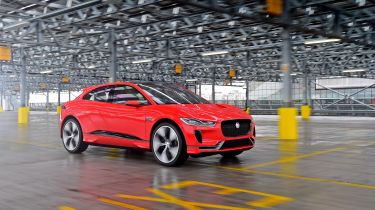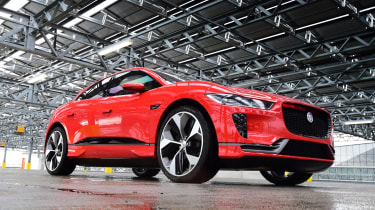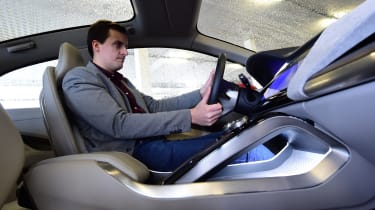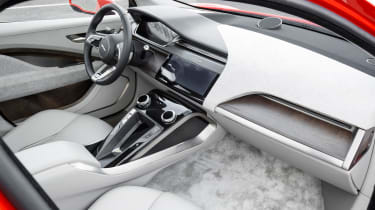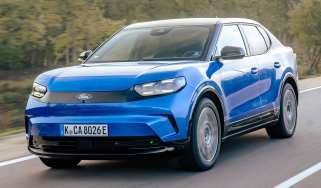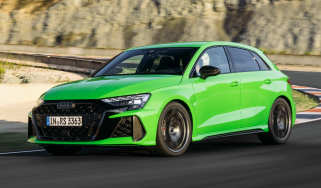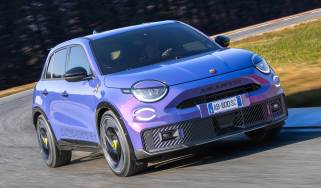Jaguar I-Pace concept review
We get behind the wheel of the Jaguar I-Pace concept for a glimpse of how electric-powered Brit is set to shake up the market
Our brief drive didn’t allow much dynamic evaluation, but the I-Pace looks set to deliver clever packaging and Jaguar’s most airy cabin to date. With 350 deposits taken, and an anticipated £60,000 price tag undercutting the cheapest Tesla Model S, we already expect the I-Pace to be a hit.
The Jaguar I-Pace is one of the most important vehicles to emerge from the British car maker in its 80-year history. With Tesla and BMW’s ‘i’ range in its sights, the striking EV will usher in a new dawn for Jaguar when the production version hits the streets in the second half of 2018.
There is only one I-Pace in existence – officially, at least – and now Auto Express has spent some time with the concept, and even had a short spell behind the wheel.
This is the same show car that was on Jaguar’s stand in Los Angeles last November, but since then, its paintjob has switched from sophisticated silver to an arresting shade of red. It has even more visual impact as a result; the shape is a radical departure from Jaguar’s current model range, with a chunky, wide stance and a low and sleek hatchback silhouette.
More reviews
Car group tests
- BMW X5 vs Porsche Cayenne vs Jaguar I-Pace
- Tesla Model S vs Jaguar I-Pace
- Audi e-tron vs Jaguar I-Pace
- Jaguar I-Pace vs Tesla Model S
In-depth reviews
Long-term tests
Road tests
Used car tests
As we wait for our preview drive, Sandy Boyes, one of the chief designers in the I-Pace project, tells us the car was the perfect opportunity for a “blank-sheet design”, both in aesthetic and engineering terms. “The electric powertrain gave us an opportunity to play with the proportions,” he says. “The cab-forward design is something genuinely different for us.”
The concept is 4,680mm long and 1,890mm wide, so it’s smaller than the F-Pace, but because of the space freed up by the lack of an engine, the wheelbase has been pushed out to nearly three metres – 126mm more than the F-Pace and slightly longer than an XF, too.
However, Boyes claims that detail elements are “very Jaguar”. Everything from the body surfacing to the tail-lights is inspired by the current range, while the nose is said to take cues from the C-X75 supercar concept of 2010.
The interior of the I-Pace is a similar blend of the revolutionary and familiar. The dash is flanked by three screens – two of them touchscreens to control infotainment and driving functions. Haptic feedback controls for the steering wheel feature, but although the climate control dials are also haptic, they’re physical knobs. Boyes tells us this is primarily to create “a balance of analogue and digital for the driver, which will always remain a Jaguar trait”.
You slide across into the driver’s seat of the I-Pace, instead of climbing up into it – and sure enough, once you’re there, the overall impression is that you’re in a regular car instead of a high-riding SUV. That doesn’t mean it feels cramped, though; the cabin is bright and pleasingly airy. And while we didn’t get a chance to sit in the rear seats, there should be space for three adults in the production car.
Practicality could be an I-Pace strength. Boot space stands at 530 litres, and there’s a small compartment where the engine would normally sit, with an additional 28 litres.
We weren’t able to exploit the road dynamics of this one-off concept, but we already know that the production I-Pace will have 395bhp from a pair of synchronous electric motors, enabling four-wheel drive. A Tesla-rivalling 0-62mph time of around four seconds is promised, but I-Pace engineering manager Dave Shaw tells us that sprinting ability isn’t the ultimate target.
“Our priority isn’t just performance,” he says. “It’s balancing performance with range in the most effective way possible.” He promises an NEDC range of just over 300 miles from the 90kWh lithium-ion battery pack, and a recharge time of only two hours from a 50kW DC point.
